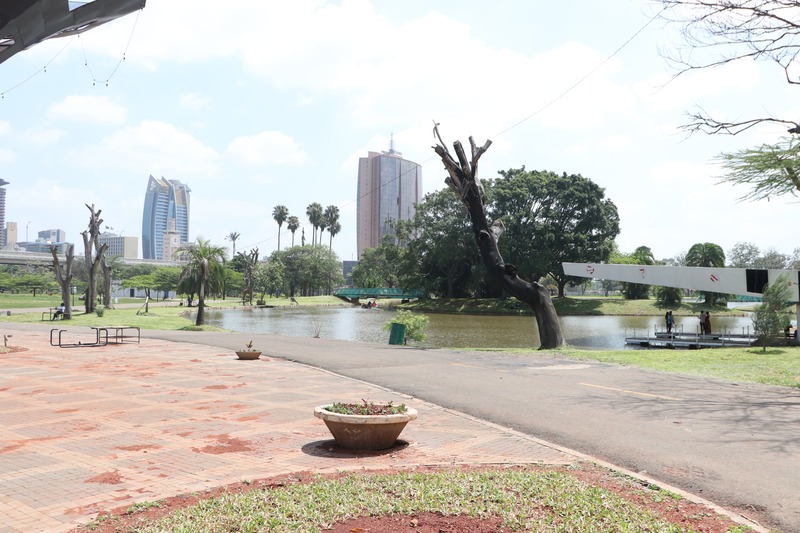Uhuru Park: City’s green space that has survived developers' appetite for decades

Uhuru is Swahili for freedom, and Uhuru Park embodies freedom in the most unlikely way.
The decision by environmental rights lobby groups to go to court to stop plans by the Nairobi City County government to lease out Uhuru Park to private entities for commercial purposes has brought back memories of the long-standing battles to protect the park from hawk-eyed authorities seeking to snatch it from the public.
Uhuru is Swahili for freedom, and Uhuru Park embodies freedom in the most unlikely way. At Uhuru Park, one of the first things you are likely to observe is the Freedom Corner.
More To Read
- Green Congress of Kenya party opens countrywide offices, eyes green revolution
- Kenyan Muslims plant 10,000 trees at Uhuru Park in solidarity with Palestine
- Environmentalists decry logging in Mau Forest as betrayal of climate commitments
- Matiang’i: Raila’s 'swearing-in' at Uhuru Park was my toughest test at Interior docket
- Africa’s ‘great green wall’ is stalling: In Senegal very few planted areas show progress
- Lawyer moves to court over Nairobi City Park takeover by KFS
Freedom Corner is associated with the late famous environmentalist and Nobel Peace Laureate, Prof Wangari Maathai. That's the place where she led a group of women on a hunger strike to pressure the government to release political prisoners incarcerated by the government of the late former president Daniel Arap Moi.
The women were dispersed after four days of protest, and Maathai and a few other women were subjected to such police brutality that they were admitted to hospital unconscious.
As narrated in her book Unbowed, Maathai had earlier in 1989 successfully led protests to protect Uhuru Park from being taken over by the government and private developers to build a 60-storey business complex, which was to house then-ruling party Kanu headquarters.
According to an article by the Green Belt Movement Board Chairperson Marion Kamau titled "Hands off Uhuru Park – The green heart and Kenyan city jewel", Uhuru Park was gazetted and opened to the public by the late Mzee Jomo Kenyatta on May 23, 1969.
Air pollution filter
"Ecologically the park serves as the lungs of over 4 million Nairobi residents, shielding them from the silent killer of today (air pollution), it's also a green space that reduces ambient heat in cities, mitigates the effects of other forms of pollution and absorbs greenhouse gases," notes Kamau.
According to her, the green space is also an invaluable haven in the heart of downtown Nairobi as it also acts as simple but socially vital safety valves for ordinary men and women to release some of the pressures of daily life in the city, especially for those who've left rural areas for the promise of more and better-paid work in the city and find themselves living in treeless informal settlements or featureless tower.
"The Green Belt Movement has and remains acutely alert to the full preservation and conservation of such monuments of our heritage across all the Counties. We do this selflessly for the public good and to the unborn future generations."
Refuted leasing reports
Nairobi Governor Sakaja Johnson has, however, refuted recent reports suggesting that Uhuru Park and Central Park might be leased out to private entities.
In a statement, Sakaja assured city residents that the parks will remain public and that the county government is focused on improving them for the benefit of all residents.
"We are adding value to these spaces by introducing amenities such as food stalls, bouncing castles, recreation facilities, and boat riding. These services will be provided by interested parties to enhance the experience for the thousands of visitors who frequent the park," he said.
The governor said that Uhuru Park belongs to the people of Nairobi and that there are no plans to privatise it.
"Uhuru Park is not up for lease. It belongs to the people. On a good weekend, we host between 5,000 and 10,000 visitors. Our goal is to ensure they can relax, enjoy refreshments, and participate in park-like activities," Sakaja said.
Align with global standards
According to the governor, the decision to introduce these services was made during a recent Cabinet meeting, where the executive discussed aligning Nairobi's recreational spaces with global standards.
"Globally, parks offer a variety of activities to enhance visitor experiences. These services have been missing in Uhuru Park, even after its renovation," Sakaja noted.
Under the new plan, the county will collaborate with interested parties to introduce food stalls, children's bouncing castles, and boat riding services.
These additions aim to make the parks more vibrant and family-friendly while preserving their public nature.
"The county government cannot run food stalls or boat rides. Our role is not to make a profit but to facilitate public enjoyment. Those interested in offering these services will have the opportunity to contribute to enhancing the park experience," Sakaja explained.
He assured the public that every decision made prioritises their interests.
"Our public spaces are treasures, and we are committed to preserving and protecting them for future generations," he said.
Top Stories Today












































